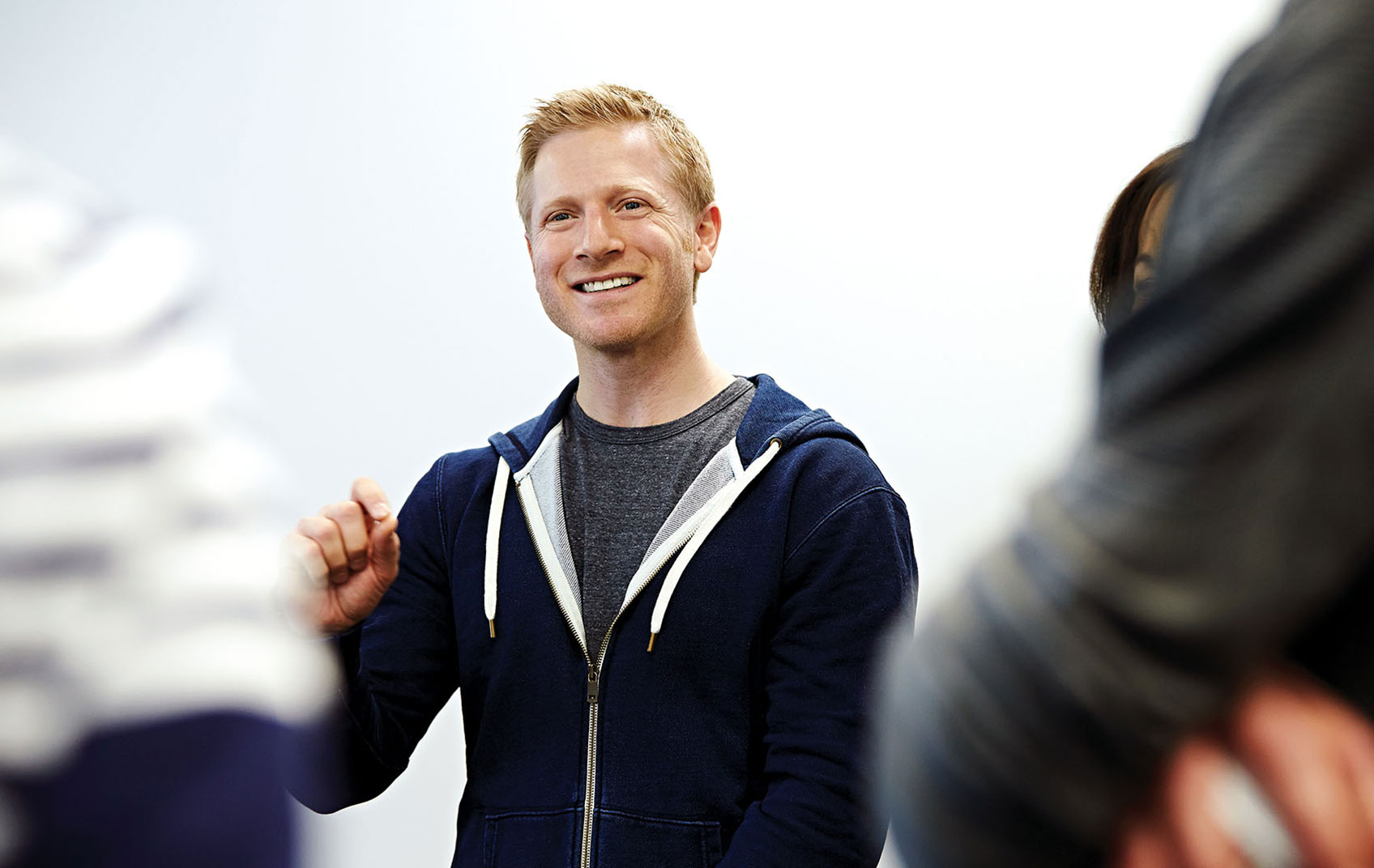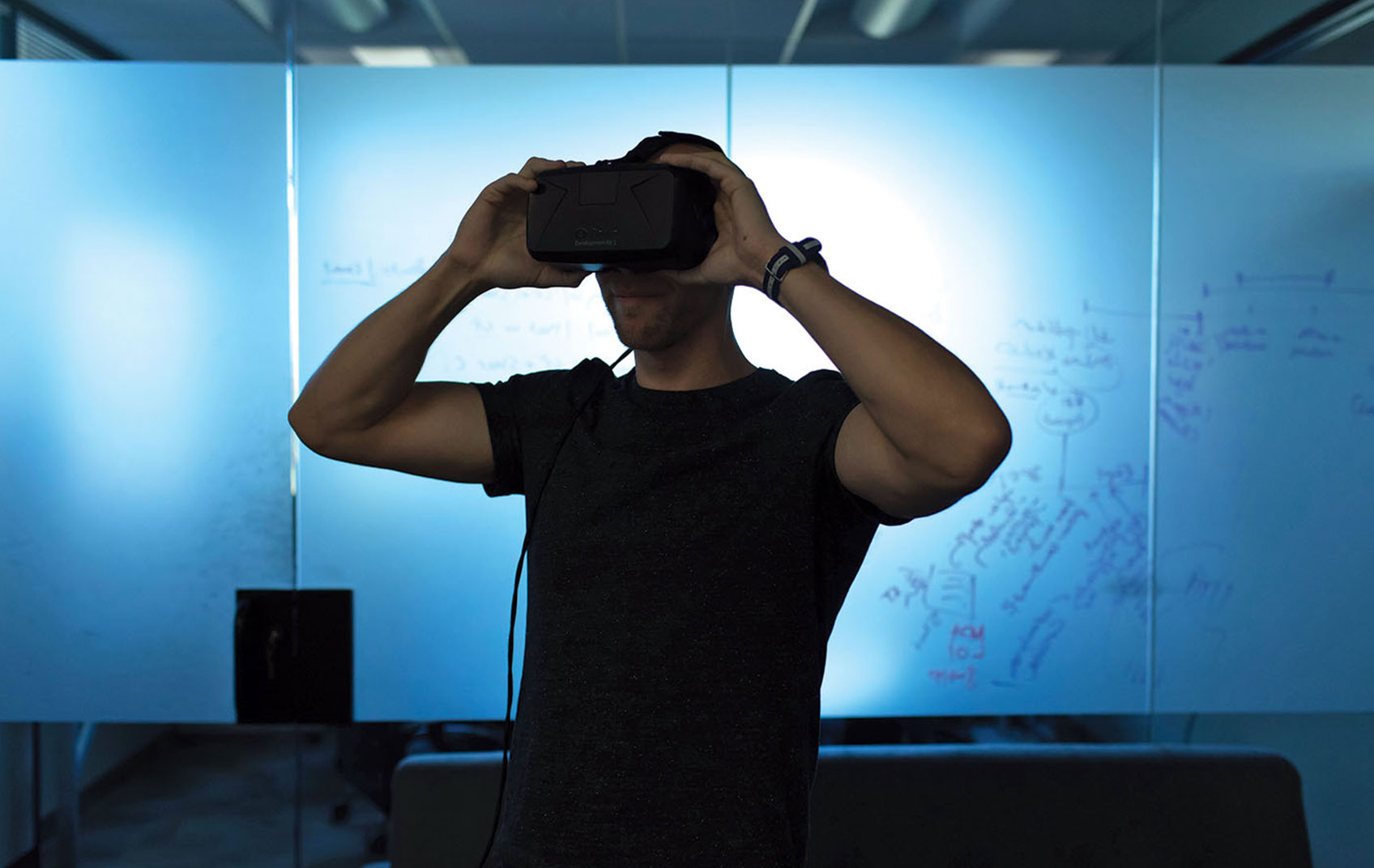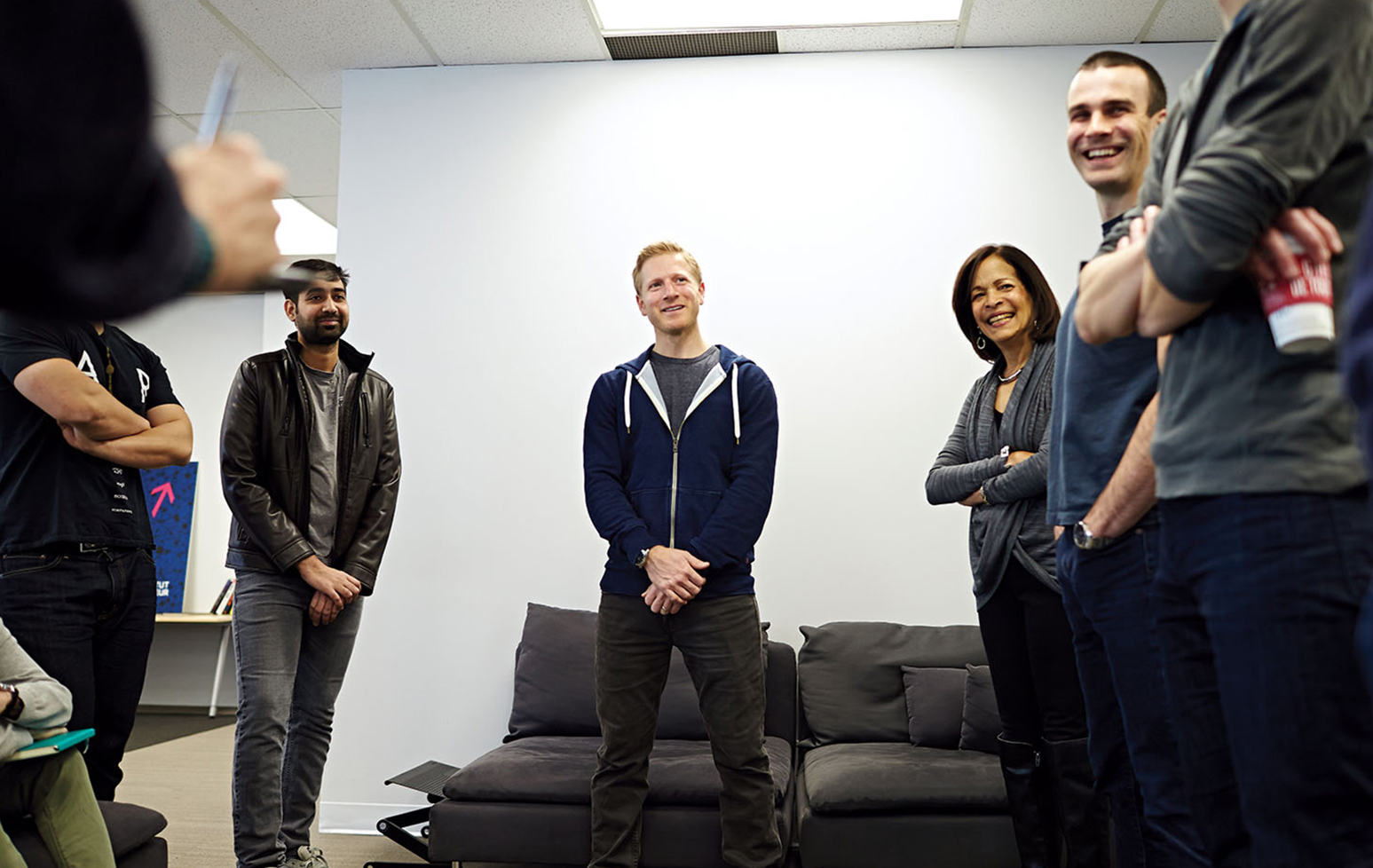Artificial intelligence is transforming business and life
In the classic film 2001: A Space Odyssey, HAL the computer helps operate a spaceship travelling to Jupiter. HAL can reason and speak and understand speech. He can recognize faces, appreciate art, and interpret emotions. He is an unbeatable chess player. But everything goes awry when HAL begins to make small processing errors and his crew-mates decide to turn him off. To protect himself, HAL turns into a killer.
The 1968 movie is remarkably prescient, seeing ahead both to the incredible advances in artificial intelligence (AI) in recent years, and to the concerns that AI raises for some people. “AI is transformative,” says Benji Sucher, HBA ’05, Chief Operating Officer at Layer 6 AI (pictured above, centre). “But the idea that you plug in a computer and it thinks and acts like a human is science fiction.” Still, AI is already woven into our daily lives and used by enterprises large and small. Several Ivey alumni are at the forefront in this powerful technology, using AI to disrupt a wide variety of industries.

The Next Paradigm
Artificial intelligence is about the ability for computers to sense, comprehend, and learn, says Courtney Campbell, HBA ’09, Senior Consultant, Digital Strategy and Innovation at CIBC (pictured above). “With AI, computers can absorb a very large amount of data, model it, use it to make educated decisions and predictions, and then take action based on it.” For example, AI is a critical component in self-driving cars. Sensors provide data on the surrounding environment, and the car decides how and where to drive.
Sucher makes a distinction between artificial general intelligence – the near-human capability that HAL was endowed with – and narrow artificial intelligence – the kind that enables a computer to do one thing very well. For Omar Dhalla, MBA ’07, Senior Vice-President at Element AI, AI is simply “the next paradigm of computing.”
Campbell points out that research around artificial intelligence has been ongoing since the 1950s. But it’s only in the past decade, with advances in technology, massive amounts of data, and increased computing power, that it has become a truly disruptive force. It was in Canada that University of Toronto Professor Geoffrey Hinton made the significant research breakthroughs in artificial neural networks that have fuelled AI’s growth, and Canada continues to be a leader. By some estimates, the global AI industry is expected to grow to $70 billion by 2020.

Transforming the Enterprise
We hear in the popular media about AI-enabled computers who can play Go, write music, and even make Halloween costume suggestions (but not very good ones). But AI isn’t a party trick: it’s an increasingly important business tool. Sucher’s company, for example, is harnessing the power of AI to help financial institutions make predictions and personalized recommendations to their customers. “Banks have a massive amount of data,” he explains. “AI creates an opportunity for them to leverage that data for value and to differentiate themselves, enhance their brand, and create a great personal customer experience.
Layer 6 AI was working with financial institutions across Canada and the U.S., and responding to inquiries from Asia, South America, and Europe. In part, that’s because they won the prestigious ACM RecSys Challenge in 2017. (Chinese behemoth Alibaba won the same competition in 2016.) In January 2018, TD Bank acquired Layer 6. The company retained its brand name and separate office, but TD became its sole client.
Sucher believes there are also significant opportunities in health care, where AI could be used to, for example, diagnose skin lesions or read X-rays. “There will always be physicians,” he says, “but AI can augment, improve and enhance what’s being done, helping people sooner.”
In the financial services industry, Campbell envisions AI applications for everything from anti-fraud and money laundering operations, to credit risk management and even personal financial advising. “Organizations in many industries can find themselves in a position where they have large amounts of data, but it may be difficult to analyze this data efficiently,” she says. “AI can help.” Like Sucher, she is excited about the ability to personalize marketing, offerings, and brand experiences. “If you’re able to understand your customers, you can serve them better and provide them with more products – ones they actually need, or will need.”
Fireminds, a Bermuda-based enterprise software development and managed cloud company, was founded by Michael Branco, EMBA ’10. (Fireminds was acquired in 2017 by ATNI.) Branco’s team has been working with reinsurance companies to use big data and machine learning to predict how many hurricanes will hit selected locations in the future, how bad the storms will be, and as a result, how insurance premiums should be priced. “For 20 years reinsurance companies have been using large datasets to predict property and casualty premiums,” Branco says. “AI is put to good use helping with the calculations.”
Branco’s other company, Premier Tickets, is an online ticket service and e-commerce platform. It uses AI to power the website’s live chat feature and customer-care tools. If the AI chatbot can’t answer a customer’s question, the conversation is seamlessly handed off to a live agent, who can pick up where the chatbot left off. Premier uses Natural Language Processing to do “sentiment analysis” to determine if a customer is unhappy and escalate them to a human agent quicker. Branco sees potential for AI chatbots to handle insurance quotes, too. In fact, he says any enterprise can take a close look at its operations and find ways to imbed AI, using off-the-shelf software to improve processes and where possible, offload standard tasks.

Brave New World of Work
Colin Lernell, HBA ’16, is Lead Product Manager for Student Experience at Udacity (pictured above), a for-profit educational organization that offers free online courses and intensive online “nanodegree” programs. Ninety thousand students enrolled in Udacity’s first-ever AI course in 2012. The company works with tech companies like Google, Facebook, and IBM to offer courses and programs in artificial intelligence, deep learning, machine learning, and self-driving cars, and is preparing to launch a nanodegree degree in flying car engineering.
The company also uses AI tools to support and provide services to students. “We have many types of human-to-human interactions, from student services to mentorship,” says Lernell. “All of these functions have some AI-assisted components.”
Omar Dhalla got interested in AI while working with Real Ventures, a Canadian seed capital company. He worked with a company using AI for legal research, and another building AI-enabled robotics for industrial environments. Intrigued, he jumped into Element AI when it was launched last year. The company’s co-founder, Yoshua Bengio, is a leading researcher in deep learning. “We help our customers strategize about what their industry will look like five to 10 years out,” Dhalla says. “Then we determine what things we should be doing with AI now to build cognitive muscle.”
So far, Element AI has built everything from recommendation engines to fraud-detection systems. The team is in the process of working with a media company to create an engine that will read articles written by journalists and select appropriate imagery to illustrate them. Another project involves working with a large international bank to envision the future of banking in 10 years and then figure out where to deploy AI solutions now. “We don’t believe in commodity AI,” says Dhalla. “You need insight to understand what it will mean in the context of running your business.”
Talk to Me
Speech recognition is one area where AI is poised to have a dramatic impact. Niraj Bhargava, MBA ’91, is CEO of Fluent.ai, a Montreal-based startup. The company’s proprietary software is “acoustic-only,” meaning that it doesn’t need to translate speech to text to understand commands. It offers high accuracy and works without an Internet connection, so it’s ideal for wearables and smart devices. Moreover, it can be quickly trained to understand any language, making Fluent.ai a global company out of the blocks. “We believe that voice is the ideal user interface for any technology,” Bhargava says. “Our technology enables that.”
Fluent.ai software is already being used by several customers. One is producing a smart watch that can be used by children to get in touch with their parents in emergency situations. Another is a telecommunications company using AI in its call centre. The company is working to develop business in China, which Bhargava says is “... a fast-moving, hungry market that recognizes the validity of our differentiation.”
So, what does the future hold? Certainly, AI will be an increasingly important business tool, and an integral part of everyday life. Lernell points out that it’s already baked into many products, even if consumers don’t recognize it. “Nearly every digital product you use already has some machine learning or more advanced AI components to it. In future, every digital company will be driven by AI.”
But will AI become smart enough to replace humans? Researchers have found that Google’s AI has an IQ of about 47, putting it slightly below that of the average six-year old. “Computers have lots of advantages – they can analyze, interpret, and learn incredibly fast. They run 24/7, and they aren’t influenced by emotions,” says Campbell. “But they’re not perfect, and they haven’t mastered creativity, intuition, and empathy. Instead of looking at AI as competition, I think we should see the opportunity for collaboration.”
Is There a Downside?
Elon Musk says AI will cause World War III, and autonomous weapons will ensure it is fought on an unimaginable scale. Vladimir Putin says the country that leads in AI will rule the world. Do the benefits outweigh the risks? Here are a few thoughts:
“People are looking at AI as completely disruptive, changing the way we live. But we’ve been living through disruption, and evolving and adapting, for centuries. Focusing on the dangers of AI distracts us from all the positive benefits that come from it.” —Benji Sucher, HBA ’05
“There will be changes in the labour market, in the same way robotics took over car assembly lines in the 80s. AI will replace many jobs 20 years from now. If I was mentoring someone, I’d say become a subject matter expert first and then bolt technology onto that.” —Michael Branco, EMBA ’10
“There are upsides and drawbacks to everything. But if you can identify the risks, and weigh them against the benefits, you can make educated decisions about how and when to embrace AI in your business. As an individual, the same applies – learn how AI can be used to help you, or how it may impact your job, and plan accordingly.” —Courtney Campbell, HBA ’09
“I think the world is a little blind to how much power Google, Amazon, Facebook, and Apple have. It doesn’t mean they’re going to do bad things, but there’s a centralization of power created by data plus insights that we’ve never seen before.” —Omar Dhalla, MBA ’07
“Talking about the dangers of AI in the future distracts us from all the positive benefits – increased productivity, improved quality of life, reduced income disparity, the ability to cure disease and feed the world. A lot of people think Terminator, but I’m more optimistic.” —Colin Lernell, HBA ’16
“Could AI be used in areas that aren’t moving society forward? Sure, there’s a risk. But we believe there are strong opportunities for socially responsible technological advances with AI, so let’s get on with it!” —Niraj Bhargava, MBA ’91
Photos (Benji and Courtney): Nation Wong
Photo (Colin): Margo Moritz
Art Direction: Greg Salmela, Aegis



